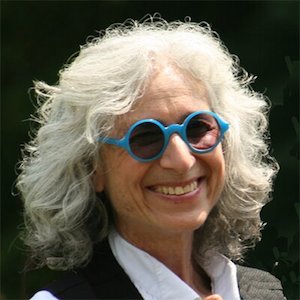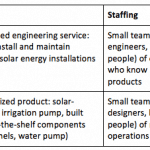Got a Great Idea? Don’t Start Your Own Nonprofit: A Q&A with Dr. Jane Aronson
Dr. Jane Aronson is president and CEO of the Worldwide Orphans Foundation, a nonprofit that helps vulnerable children – and supplies developmentally appropriate toy libraries – in Bulgaria, Ethiopia, Haiti, Serbia, Vietnam and the United States. Her pediatric practice in New York City specializes in adoption medicine and she’s conducted medical missions to orphanages all over the world. She’ll deliver a keynote address entitled “Scaling an Idea: Innovation at its Best” at Unite for Sight’s Global Health & Innovation Conference this weekend at Yale University. In this Q&A, conducted over the phone and edited only slightly for clarity, she talks about – among other things – organizational growth, common mistakes made by NGOs, and the problem of falling in love with your own great idea.
Kyle Poplin: Could you give me a snapshot of what you do at your organization, what your focus is, what you do day to day?
 Dr. Jane Aronson (left): Sure. The mission of the foundation is to provide children who are at risk and vulnerable, with access to education, medical care and psycho-social support. To provide opportunities for the child to be independent and successful in their own community. That’s the mission. The vision is played out through enrichment services and that is currently through toy libraries, which we have 40 of. We’ve been in 15 countries; we’re currently in five countries, including the U.S.
Dr. Jane Aronson (left): Sure. The mission of the foundation is to provide children who are at risk and vulnerable, with access to education, medical care and psycho-social support. To provide opportunities for the child to be independent and successful in their own community. That’s the mission. The vision is played out through enrichment services and that is currently through toy libraries, which we have 40 of. We’ve been in 15 countries; we’re currently in five countries, including the U.S.
K.P.: Has the global refugee crisis impacted your work at all?
J.A.: That’s an interesting question. I wish it did.
K.P.: How so?
J.A.: If you’re in a country with large migrating populations, then you likely get a chance to help. But there are several problems going on. We do take care of some refugees in Sofia, Bulgaria, because they migrated there and we had access. But the problem is, if the migrating populations end up in refugee camps, there may be little access for service. There are lots of bureaucratic and political impediments to providing refugees with services. And, in fact, most of the camps don’t have the necessary pieces in place for education, psycho-social support and access to medical care.
Tens of thousands of children die every year in refugee camps all over the world due to the lack of coordination and access to the constituent pieces of that puzzle that I just mentioned. Which includes: they can’t go to school, they suffer terrible food insecurity, they don’t have the kind of support that we might provide to them, which includes play and exercise and recreation and music, art and theater and dance. The expressive arts are very important to the spirit of both the children and adults, to help fight off depression.
K.P.: You’re a keynote speaker at this weekend’s Unite for Sight conference. What’s your topic? I’ve attended the past couple of years, and it’s an amazing group of talent.
J.A.: I feel like I’ve gotten a very broad education by participating in the conference over the last decade. I started out pretty well educated because I am an HIV-trained physician and excelled at providing HIV care in three countries. Then I really wanted to understand the actual process of growing developmentally as an organization and being able really to understand where we would have our legacy, long term. The conference was a really great way for me to meet people and also speak about the process of organizational growth. And that’s where I excel in my participation; I speak to the actual process that I helped build over time. We’re 20 years old and I speak about the nuts and bolts of growth. …
My most important contribution to the conference, or others places where I speak, is about scale. How does an organization take the vision to scale? I love to talk about what vision means, particularly in times when there’s little money or there’s challenges to money. It’s really important to continue to provide aspirational and ambitious elements to the foundation, at all costs. I would always encourage entrepreneurial thinking and social entrepreneurship as business building.
I talk a lot about how you build your brand as an NGO; what partners you need to be involved with to build that brand. And how do you use the building of that brand to match your vision. I have partnerships with brand builders and business development. It doesn’t differ that much between not-for-profit and profit – you’re looking to create a model that generates revenue.
That’s what our toy library is about. We provide services in the community that are about treating developmentally delayed children. … But we’re also a workforce development entity. We hire people from the community and teach them early childhood development, thus providing them with the opportunity to improve their daily life.
K.P.: What you hope to impart to people is to be aware of your brand as an NGO, and how to improve that brand. Is that fair to say?
J.A.: Yeah, exactly. You want to be the best NGO you can be. Unfortunately, lots of NGOs consistently challenge themselves because they’re not focused enough on their vision and they don’t look at where they are in the constellation of organizations around world, so they can be true to the concept of not duplicating services, and growing to become much more invested in partnerships. That’s the hardest challenge because people are so in love with their own idea.
K.P.: I know there will be a lot of young people at this conference. What’s your advice to young people who want to get involved in global health? Is there still a role for individuals to make a difference?
J.A.: Absolutely. But I think the problem is that everyone thinks they have a great idea and then they want start a not-for-profit. And that’s really the weakness of aid work, is people forming their own organizations. They should be working for other organizations and studying and learning … becoming extremely well versed in how to think about aid.
K.P.: Is that a relatively new concept – young people wanting to start their own organization as opposed to working for other people?
J.A.: I think as long as humans beings are on the planet, I think people get excited, they’re passionate and they’re in love with their own ideas. And they think they can do this work because they don’t see that it’s so academic. So, as long as we’ve had the idea of going to a country outside our own to work, or work in our country for poor people, the problem with working to help the poor has been that people don’t understand the problems of the poor. They think that they can just do some good and they don’t understand that there’s a body of information to acquire; there are principles.
K.P.: And the best way to get that knowledge is to join up with an organization that’s already serving that community and learn?
J.A.: Yeah. That’s the best way, and then, of course, there’s a course of study. There are organizational ways in which to study that – a master’s in public health, master’s in public administration, master’s in public policy. Those degrees really are very important to being a serious global health worker, both domestically and internationally, because they teach you the importance of strong economic principles, metrics, vision and mission. … There’s a spinal cord, a backbone of making sure that you can run an organization that will be successful.
K.P.: At the end of your career, what will make you look back and say that you’ve been a success? What do you hope you will have accomplished?
J.A.: I don’t see that my work will end. I’m not wanting to retire. I want to continue to think.
This is a really important question about organizations, not only me as an individual. There is an inherent weakness in how people look at funding and the longevity of work, where one is trying to extinguish generational problems like poverty. And the inherent weakness in all of this is that you can grant people money for three years, five years, 10 years, but there’s very little attention to the understanding that human nature, the way it is, does not subscribe to prevention or anticipating the future. And, as a result, those short-term grants actually disable the growth and development and success of organizations, period.
And that goes along with the longevity of us as workers. Experience is the best teacher. Experience drives success. And so, for me and anyone who does this work, the growth of the vision and the experience is powerful and it doesn’t end. … Things change as you grow older and you change the style in which you work. But you continue, hopefully, to grow your organization so that talent continues to grow. And you acquire people in the organization who are talented and devoted and committed and you inspire that. And you move away from the sort of gritty day-to-day stuff but continue to (provide) a powerful vision and a powerful role model of commitment – an undying commitment to the belief in the human spirit – and that is why you don’t stop working when you do this work.
K.P.: In that sense, it’s not work. It’s a calling.
J.A.: It’s a way of life. It’s my destiny. It’s a calling. But I’m learned. And I’m always learning. I was a bad manager at one point. Now I’m a better manager. It’s really important to learn from mistakes. And to learn developmental models. …
The final word … is that the world is overpopulated and migration is a way of life now and will be probably for hundreds of years. The issues of conflict and war will increase and that will actually stimulate more migration, unfortunately; migration away from rural communities to urban settings. It will change the way we live. We have to learn how to live better together. Peace and cooperation and stability are becoming even more important now than they ever were.
Kyle Poplin is the editor of NextBillion Health Care.
Photos courtesy of Worldwide Orphans
- Categories
- Health Care



